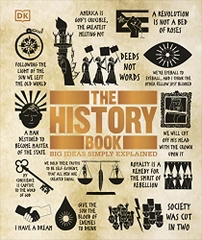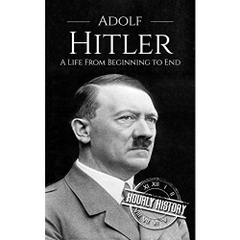-
-
-
Tổng tiền thanh toán:
-
-
Thông tin
-
Tìm sách theo yêu cầu
Book Description
Publication Date: October 15, 2012
Science is fantastic. It tells us about the infinite reaches of space, the tiniest living organism, the human body, the history of Earth. People have always been doing science because they have always wanted to make sense of the world and harness its power. From ancient Greek philosophers through Einstein and Watson and Crick to the computer-assisted scientists of today, men and women have wondered, examined, experimented, calculated, and sometimes made discoveries so earthshaking that people understood the world—or themselves—in an entirely new way.
This inviting book tells a great adventure story: the history of science. It takes readers to the stars through the telescope, as the sun replaces the earth at the center of our universe. It delves beneath the surface of the planet, charts the evolution of chemistry's periodic table, introduces the physics that explain electricity, gravity, and the structure of atoms. It recounts the scientific quest that revealed the DNA molecule and opened unimagined new vistas for exploration.
Emphasizing surprising and personal stories of scientists both famous and unsung, A Little History of Science traces the march of science through the centuries. The book opens a window on the exciting and unpredictable nature of scientific activity and describes the uproar that may ensue when scientific findings challenge established ideas. With delightful illustrations and a warm, accessible style, this is a volume for young and old to treasure together.
Editorial Reviews
From Booklist
Following A Little History of the World, by E. H. Gombrich (2005), which was a translation of a 1935 German original, Yale has replicated that book’s approach in titles about language, philosophy, and now, science. In 40 short chapters adorned with whimsical illustrations in woodcut style, Bynum proceeds from counting to cosmology. A professor of medicine, Bynum provides numerous glimpses into the advancement of human health through précis of particular theories and discoveries associated with famous names, starting with Hippocrates and Galen, including such others as Paracelsus and William Harvey, and finishing with Louis Pasteur and modern antibiotic pharaceuticals. Noting biographical details of the scientists mentioned, such as the solitary personality of Isaac Newton, Bynum connects their characters to whatever scientific mystery piqued their curiosity. In the process, he often approaches a topic by extrapolating from a common experience, as from bird-watching to dinosaurs. A super-accessible introduction to science. --Gilbert Taylor
Review
""Bynum's lively narrative . . . certainly delivers on his opening line: 'Science is special.'"" ---Kirkus Starred Review
Product Details
File Size: 959 KB
- Print Length: 272 pages
- Publisher: Yale University Press (October 15, 2012)
- Sold by: Amazon Digital Services, Inc.
- Language: English
- ASIN: B009JBPXU8
- Text-to-Speech: Enabled

- X-Ray:Not Enabled

- Lending: Not Enabled
- Amazon Best Sellers Rank: #221,552 Paid in Kindle Store (See Top 100 Paid in Kindle Store)
Most Helpful Customer Reviews
8 of 8 people found the following review helpful
5.0 out of 5 stars Loved so much, Had to OWN May 19, 2013
By karrots
Format:Hardcover
I read the other reviews and your love or hatred of this book depends entirely it seems on your expectations and background. So, I'm an educated adult who went the language route and avoided all serious math and science college classes, but I love learning. So I picked up A Little History of Science at the library and LOVED it. This is not an in-depth look at the sciences, but a broad historical background that shows how modern science has come to be...by standing on the shoulders of those who came before.
What I loved about this book is that it provides a historical context for those famous names and scientific ideas/concepts and gives them a frame of reference by tying them together. By presenting these famous names with interesting anecdotes or details about their life or work, and relating them to others who had opposing ideas/theories/philosophies or actually used the ideas and built upon them, this book is a perfect jumping off point for further investigation. For example, I really loved the Engines and Energy chapter and Bright Sparks because it explained a couple of concepts for me that I've never understood (like how engines work and how electricity and magnetism are related). Also, it introduced me to people I'm going to read more about because this book literally only touches on them.
I'm going to have my 6th grader read this book next, because as another reviewer noted, it is written in a really accessible way. For those of you with science/political/religious issues, I should warn you that the author does make the occasional gentle editorial side-note about global warming, animal extinction, homosexual tolerance, and (as shown in the chapter list below) has chapters on the big bang, dinosaurs, humans as great-apes, and discusses the age of the earth.
Overall, I would really recommend this book to people (ages 10+) who love to learn and enjoy history but may not have a strong science background.
There are 40 chapters (In the parenthesis are my own very brief summaries of what the chapter is about if not obvious):
1-In the Beginning (Egypt/Babylon), 2-Needles and Numbers (India/China), 3-Atoms and the Void (Greeks/BigThree), 4-The Father of Medicine: Hippocrates, 5-'The Master of Those Who Know':Aristotle, 6-The Emperor's Doctor: Galen, 7-Science in Islam, 8-Out of the Darkness (Middle Ages), 9-Searching for the Philosopher's Stone (alchemy-chemistry), 10-Uncovering the Human Body (Vesalius), 11-Where is the Centre of the Universe? (early astronomy), 12-Leaning Towers and Telescopes: Galileo (astronomy), 13-Round and Round: Harvey (circulation/human body), 14-Knowledge is Power: Bacon and Descartes(attitudes on science), 15-The 'New Chemistry' (Boyle & Hooke), 16-What Goes Up...: Newton, 17-Bright Sparks (electricity & magnetism ... probably my favorite chapter!), 18-The Clockwork Universe (Newtonian-ism across Europe via Voltaire), 19-Ordering the World (classifying plants&animals), 20-Airs and Gases (very interesting), 21-Tiny Pieces of Matter(atoms&elements), 22-Forces, Fields and Magnetism (Faraday & Maxwell), 23-Digging Up Dinosaurs, 24-The History of Our Planet (geology), 25-The Greatest Show on Earth (Darwin), 26-Little Boxes of Life (early microbiology), 27-Coughs, Sneezes and Diseases (Pasteur plus many others-very interesting), 28-Engines and Energy (loved this-converting to mechanical energy), 29-Tabling the Elements (Mendeleev plus others), 30-Into the Atom (nuclear&quantum physics simplified - which I appreciated), 31-Radioactivity (Rontgen,Curies&Manhattan Project), 32-The Game-Changer: Einstein, 33-Moving Continents (plate tectonics), 34-What Do We Inherit? (genes&eugenics), 35-Where Did We Come From? (family of great-apes-findings on early man to neanderthals), 36-Wonder Drugs (development of drugs like penicillin & insulin), 37-Building Blocks (mostly DNA), 38-Reading 'the Book of Life': The Human Genome Project (understanding how DNA/genes works), 39-The Big Bang (Hubble, Gamow, +many/science deals with how, not why) 40-Science in Our Digital Age (computers advancing science).
Hope this helps!
What I loved about this book is that it provides a historical context for those famous names and scientific ideas/concepts and gives them a frame of reference by tying them together. By presenting these famous names with interesting anecdotes or details about their life or work, and relating them to others who had opposing ideas/theories/philosophies or actually used the ideas and built upon them, this book is a perfect jumping off point for further investigation. For example, I really loved the Engines and Energy chapter and Bright Sparks because it explained a couple of concepts for me that I've never understood (like how engines work and how electricity and magnetism are related). Also, it introduced me to people I'm going to read more about because this book literally only touches on them.
I'm going to have my 6th grader read this book next, because as another reviewer noted, it is written in a really accessible way. For those of you with science/political/religious issues, I should warn you that the author does make the occasional gentle editorial side-note about global warming, animal extinction, homosexual tolerance, and (as shown in the chapter list below) has chapters on the big bang, dinosaurs, humans as great-apes, and discusses the age of the earth.
Overall, I would really recommend this book to people (ages 10+) who love to learn and enjoy history but may not have a strong science background.
There are 40 chapters (In the parenthesis are my own very brief summaries of what the chapter is about if not obvious):
1-In the Beginning (Egypt/Babylon), 2-Needles and Numbers (India/China), 3-Atoms and the Void (Greeks/BigThree), 4-The Father of Medicine: Hippocrates, 5-'The Master of Those Who Know':Aristotle, 6-The Emperor's Doctor: Galen, 7-Science in Islam, 8-Out of the Darkness (Middle Ages), 9-Searching for the Philosopher's Stone (alchemy-chemistry), 10-Uncovering the Human Body (Vesalius), 11-Where is the Centre of the Universe? (early astronomy), 12-Leaning Towers and Telescopes: Galileo (astronomy), 13-Round and Round: Harvey (circulation/human body), 14-Knowledge is Power: Bacon and Descartes(attitudes on science), 15-The 'New Chemistry' (Boyle & Hooke), 16-What Goes Up...: Newton, 17-Bright Sparks (electricity & magnetism ... probably my favorite chapter!), 18-The Clockwork Universe (Newtonian-ism across Europe via Voltaire), 19-Ordering the World (classifying plants&animals), 20-Airs and Gases (very interesting), 21-Tiny Pieces of Matter(atoms&elements), 22-Forces, Fields and Magnetism (Faraday & Maxwell), 23-Digging Up Dinosaurs, 24-The History of Our Planet (geology), 25-The Greatest Show on Earth (Darwin), 26-Little Boxes of Life (early microbiology), 27-Coughs, Sneezes and Diseases (Pasteur plus many others-very interesting), 28-Engines and Energy (loved this-converting to mechanical energy), 29-Tabling the Elements (Mendeleev plus others), 30-Into the Atom (nuclear&quantum physics simplified - which I appreciated), 31-Radioactivity (Rontgen,Curies&Manhattan Project), 32-The Game-Changer: Einstein, 33-Moving Continents (plate tectonics), 34-What Do We Inherit? (genes&eugenics), 35-Where Did We Come From? (family of great-apes-findings on early man to neanderthals), 36-Wonder Drugs (development of drugs like penicillin & insulin), 37-Building Blocks (mostly DNA), 38-Reading 'the Book of Life': The Human Genome Project (understanding how DNA/genes works), 39-The Big Bang (Hubble, Gamow, +many/science deals with how, not why) 40-Science in Our Digital Age (computers advancing science).
Hope this helps!
8 of 8 people found the following review helpful
5.0 out of 5 stars a little review about a very fine book January 4, 2013
By marc lippman
Format:Hardcover
Bynum's concise history is a gem. rather than the usual longitudinal approach to science it seeks to provide a greater understanding of how exactly science ''advances''. Is it the great insight or an accretion of modest advances ? and how does the society in which that those discoveries are made further or retard the pace at which those discoveries are reduced to practice ? this may be a brief discussion but it is highly sophisticated.
As someone who has spent his life attempting to advance medical science this book provided me with a substantially enhanced perspective.
As someone who has spent his life attempting to advance medical science this book provided me with a substantially enhanced perspective.
XEM CHI TIẾT TẠI AMAZON.COM
- Thông tin chi tiết
- Mục lục
- Đánh giá & bình luận của người mua
- Những cuốn sách cùng chủ đề hoặc có liên quan
Tại web chỉ có một phần nhỏ các đầu sách đang có nên nếu cần tìm sách gì các bạn có thể liên hệ trực tiếp với Thư viện qua Mail, Zalo, Fanpage nhé
Đăng ký nhận tin qua email
Hãy đăng ký ngay hôm nay để nhận được những tin tức cập nhật mới nhất về sản phẩm và các chương trình giảm giá, khuyến mại của chúng tôi.












